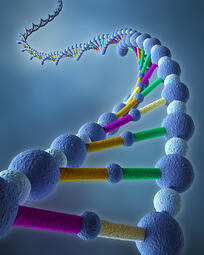Do you think the genes you’re born with determine what happens to you? 
Whether you’ll be overweight because it runs in your family or whether you’ll get diabetes since your Dad had it?
Whether you’ll develop breast cancer because your Mom died from it?
You might be surprised to know that your genes don’t have as much control as was previously thought.
Scientific American just published an article reviewing the latest information in the field of epigenetics. Here’s a quote: “Many of the contingencies of life – what we eat, what pollutants are in or environment, how often we are stressed – affect how our genes operate.” This is great news, because we have a lot of control over what we eat and how we deal with stress, and even some control over the pollutants in our environment (like our homes and cars).
Have you heard of epigenetics?
Epigenetics is the phenomenon of how our environment, which includes the foods that we eat, the toxins we're exposed to, and even our stress levels, can turn genes on and off. A new article published in Scientific American states "epigenetic effects play a crucial role in development, aging and even cancer1." Even cancer?! This is great news, that we can make choices that influence whether those cancer genes get turned on or off! We should be aware of the fact that we have significant power over our health destiny.
So, here are 3 things that you can do to drastically reduce your risk of cancer:
1. Eat cancer-fighting foods. One of the most exciting things I've learned is that foods can fight cancer. For example, cruciferous vegetables which include cabbage, broccoli, kale and cauliflower, contain powerful cancer fighting nutrients. So do mushrooms, onions, beans and green tea. Some of these foods in combination can reduce your breast cancer risk by as much as 90%! These are the foods that should dominate our daily diet.
2. Get cancer-causing foods out of your diet. On the other hand, some foods actually contribute to cancer development. Simple carbohydrate foods like white flour and sugar cause spikes in your blood sugar level which may actually promote the growth of cancer cells. Also, foods that are laden with hormones, such as meat and dairy that come from animals injected with extra hormones to make them grow, are actually cancer causing. These foods should be eaten in only limited quantities.
3. Get Your Vitamin D Levels Right. Do you know your vitamin D level? How about your thyroid levels? Vitamin D deficiency is associated with increased risk of cancer. (see Vitamin D, The Multi-tasking Hero) Low thyroid function is also associated with increased risk of breast disease and cancer. These are levels that can be checked by your physician, so that you can take proper supplementation if needed.
Armed with this information, we can stop simply hoping not to become another victim of cancer. Instead, we can fight back by giving our bodies the powerful cancer-fighting nutrients they need. And by the way, it's never too late. Even if you've been diagnosed with cancer, these 3 steps will go a long way in helping you to regain your health.
Reference
1 Skinner, Michael. The Case for Inheritance of epigenetic changes in chromosomes. Scientific American Volume 311, Issue 2
.png?width=305&height=132&name=NIHAlogoBLUE_3_transparent%20(2).png)
